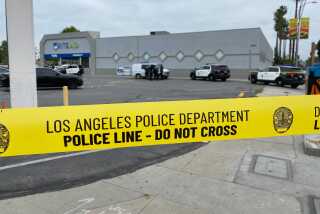The Chief Responds: Policing in a Democracy
- Share via
Antonio Olivas raises issues that are not new to any police agency. His experience is a perfect example of the tension that exists in providing public safety to a democracy.
After looking into this matter and meeting with Olivas, it is obvious that he is a very thoughtful, soft-spoken individual. In discussing this case with him, he stated that the officers were never rude, he did not feel physically threatened or intimidated and no force was ever used or threatened. The entire contact between the officers and Olivas lasted less than five minutes. Olivas has a unique physical appearance, including certain tattoos that mirror well-known gang-style tattoos. Most important, this includes the teardrop tattoo under his eye. While he acquired this tattoo for other purposes, it is most commonly seen as a symbol of having served time in prison. Olivas points out that he works as an actor portraying “tough characters.”
The officers here were alertly patrolling their city. They saw a person they did not know, a person who has strong symbols that both police and the public see as gang--read: criminal--attire. They did their job; they stopped and inquired. They tried to minimize the intrusion and the disruption of the citizen’s life while still doing their job and they did it professionally and without using force or harassment or rudeness. This encounter symbolizes the challenge of policing a free society.
This tension between crime control and individual rights is one that police officers labor under constantly: How do we work in a free and open society, recognizing the rights of all citizens while protecting the law-abiding from the criminals among us? I don’t get complaints about police conduct when we are arresting burglars in the middle of the night. As police, we try to focus on what a person is doing rather than the unique characteristics of the individual involved, but at times these concepts merge.
One thing I can state without question: Olivas was not stopped because of his race or out of racial discrimination. Undeniably that can cause a police-citizen encounter, but here there were other, objective factors at play.
Inevitably the tension between crime control and individual rights will continue. Olivas and I will continue our discussion as we wrestle together with the question of how to manage these encounters in the future.
More to Read
Sign up for Essential California
The most important California stories and recommendations in your inbox every morning.
You may occasionally receive promotional content from the Los Angeles Times.










